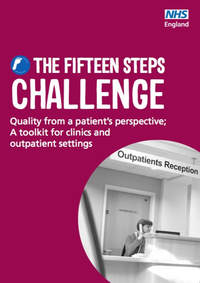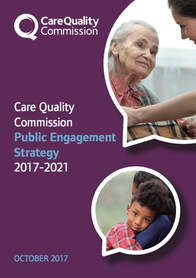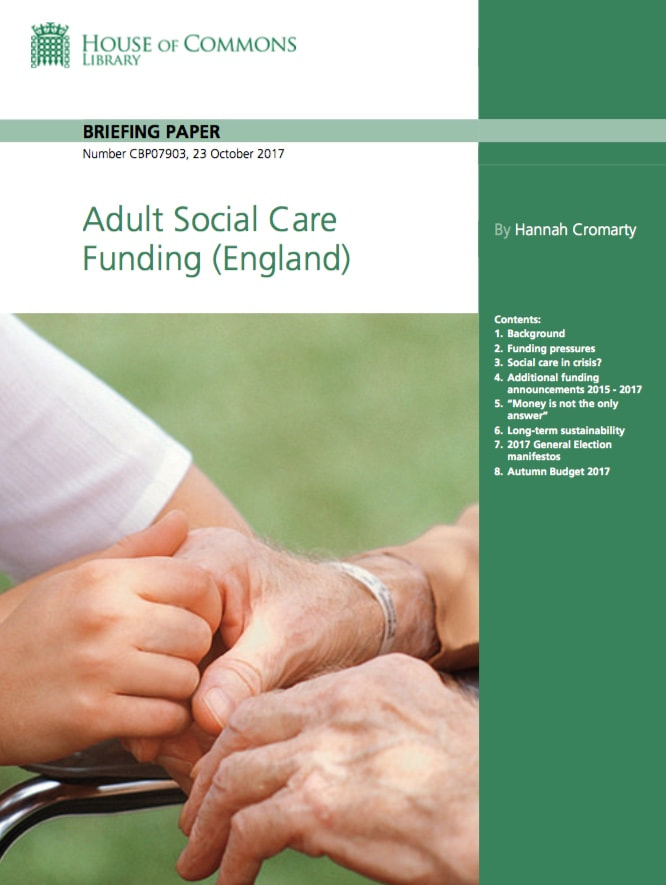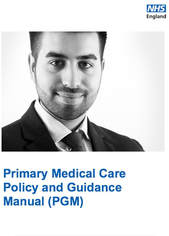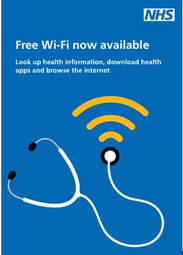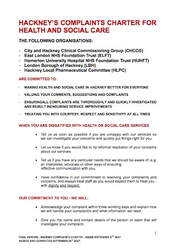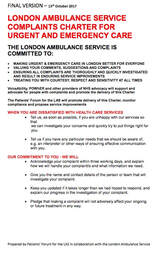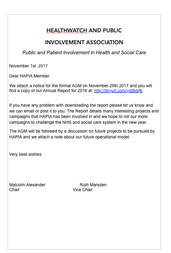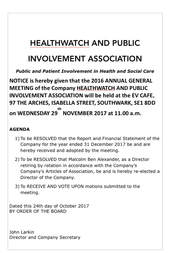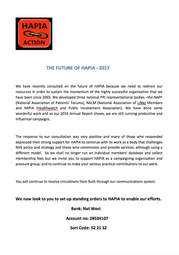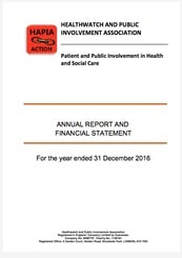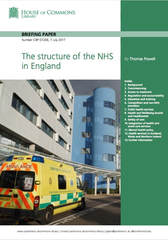NEWS - NOVEMBER 2017
ACCOUNTABLE CARE ORGANISATIONS - WHERE IS PUBLIC ENGAGEMENT?
01 December 2017
We hear that NHS England faces a tough dialogue with the Treasury post-Budget and will, most likely get the go-ahead for its latest plan – to set up Accountable Care Organisations (ACOs). For some, it is a rational response to the failure of the Lansley structural reorganisation – a logical extension to the 44 STPs created in 2016. For others, it is the clearest yet pointer to a privatised NHS, USA-style.
01 December 2017
We hear that NHS England faces a tough dialogue with the Treasury post-Budget and will, most likely get the go-ahead for its latest plan – to set up Accountable Care Organisations (ACOs). For some, it is a rational response to the failure of the Lansley structural reorganisation – a logical extension to the 44 STPs created in 2016. For others, it is the clearest yet pointer to a privatised NHS, USA-style.
NHS - AGENCY STAFF
https://www.theyworkforyou.com/lords/?id=2017-11-30a.754.1&s=GP#g754.3
Lord Hunt of Kingsheath
I am being a bit critical of the Minister. I hope he will not take it personally but take this opportunity to write to me to correct the information. Last week, in a straightforward Question about agencies, I asked, “what are the names and locations of the agencies registered to supply nurses to NHS trusts in England”?
It was a straightforward Question, but the Minister’s reply can be described only as gobbledegook. He said: “Agency rules require that agencies are on NHS Improvement-approved frameworks and these frameworks monitor and approve agencies for supply to trusts. The approved framework operators are Crown Commercial Service, NHS Collaborative Procurement Partnership and HealthTrust Europe”--
I think HealthTrust Europe is an American company.
The Answer continues:
“In addition to agencies on approved frameworks, trusts in exceptional patient safety situations can utilise the ‘break glass clause’ and work with an off-framework agency. Using an off-framework agency should be a culmination of a robust escalation process sanctioned by the trust board. Trust boards have primary responsibility for monitoring the local impact of the agency rules and ensuring patient safety”.
I spent a lot of time trying to understand it, and I have understood a bit of it. I have also found out—the latest figure I could get for any particular week—that there are 50,000 applications to use the “break glass clause”.
Are those 50,000 nurses from agencies included in the Government’s figures?
https://www.theyworkforyou.com/lords/?id=2017-11-30a.754.1&s=GP#g754.3
Lord Hunt of Kingsheath
I am being a bit critical of the Minister. I hope he will not take it personally but take this opportunity to write to me to correct the information. Last week, in a straightforward Question about agencies, I asked, “what are the names and locations of the agencies registered to supply nurses to NHS trusts in England”?
It was a straightforward Question, but the Minister’s reply can be described only as gobbledegook. He said: “Agency rules require that agencies are on NHS Improvement-approved frameworks and these frameworks monitor and approve agencies for supply to trusts. The approved framework operators are Crown Commercial Service, NHS Collaborative Procurement Partnership and HealthTrust Europe”--
I think HealthTrust Europe is an American company.
The Answer continues:
“In addition to agencies on approved frameworks, trusts in exceptional patient safety situations can utilise the ‘break glass clause’ and work with an off-framework agency. Using an off-framework agency should be a culmination of a robust escalation process sanctioned by the trust board. Trust boards have primary responsibility for monitoring the local impact of the agency rules and ensuring patient safety”.
I spent a lot of time trying to understand it, and I have understood a bit of it. I have also found out—the latest figure I could get for any particular week—that there are 50,000 applications to use the “break glass clause”.
Are those 50,000 nurses from agencies included in the Government’s figures?
NHSI AND NHS ENGLAND PLAN CLOSER COLLABORATION
30 November 2017
At an NHSI board meeting today, Baroness Harding said the regulator wanted to explore more collaboration with NHS England around what work needed to be done once, what needed to be shared and what the organisations should do separately.
Baroness Harding said it was ‘very clear’ there needed to be better collaboration ‘across the system’.
30 November 2017
At an NHSI board meeting today, Baroness Harding said the regulator wanted to explore more collaboration with NHS England around what work needed to be done once, what needed to be shared and what the organisations should do separately.
Baroness Harding said it was ‘very clear’ there needed to be better collaboration ‘across the system’.
|
THE FIFTEEN STEPS CHALLENGE - Quality from a patient's perspective.
A toolkit for Clinics and Outpatient settings ... 18 pages Background . Purpose of the 15 Steps Challenge . How does this align with other strategic initiatives? . Implementing the 15 Steps Challenge . The Walkaround - what to look out for prompts . From feedback to action . Embedding a process of continuous improvement . Need help? Appendices: A: 15 Steps Challenge Feedback Template B: Action Plan Template |
|
CQC PUBLIC ENGAGEMENT STRATEGY 2017 - 2021
11 pages
|
BABYLON PILOT ABANDONED AFTER APP IS 'MANIPULATED' BY PATIENTS
21 November 2017
- Patients used video consultation and symptom checker app to “speed up” access to a GP appointment.
- CCGs decide to pull out of testing early because patients’ responses negated any benefits of reducing demand by
managing conditions online.
- News emerges amid criticism of Babylon’s involvement in the NHS, particularly through GP at Hand partnership in
London.
21 November 2017
- Patients used video consultation and symptom checker app to “speed up” access to a GP appointment.
- CCGs decide to pull out of testing early because patients’ responses negated any benefits of reducing demand by
managing conditions online.
- News emerges amid criticism of Babylon’s involvement in the NHS, particularly through GP at Hand partnership in
London.
|
PATIENT AND PUBLIC VOICE (PPV) PARTNERS AND CHAIR'S SURVEY
November 2016 Report This Report outlines the findings of a 2016 survey of patient and public voice partners and chairs on their views and experiences. It finds that, whilst most respondents feel that their input is valued, some are unsure of the impact of their role. |
|
KEY FUNDING PRESSURES FACING ADULT SOCIAL CARE SERVICES IN ENGLAND
44 pages This Commons Library briefing paper examines the key funding pressures facing adult social care services in England and evidence of the impacts of these pressures on social care and health services. The paper explains the additional funding for adult social care that the 2015 Conservative Government announced in the last Parliament, and discusses wide-spread concern about the need for a long-term sustainable funding solution. http://researchbriefings.files.parliament.uk/documents/CBP-7903/CBP-7903.pdf |
|
PRIMARY MEDICAL CARE POLICY AND GUIDANCE MANUAL
November 2017 - 379 pages This document provides commissioners of primary care services the context, information and tools to safely commission and contract manage primary medical care contracts.] The Involvement Duty . Pages 42-44 https://www.england.nhs.uk/publication/primary-medical-care-policy-and-guidance-manual-pgm |
|
FREE WIFI IN ALL GP SURGERIES - by the end of 2017
NHS Digital is working to make sure that everyone can access free WiFi in NHS sites in England. NHS WiFi will provide a secure, stable, and reliable WiFi capability, consistent across all NHS settings. It will allow patients and the public to download health apps, browse the internet and access health and care information. Local Clinical Commissioning Groups (CCGs) and NHS Trusts are responsible for choosing a supplier that can provide an NHS WiFi compliant system which suits their needs, and working with them to implement it across their local NHS sites. https://www.networks.nhs.uk/networks/news/nhs-wifi-programme |
|
HEALTHWATCH ENGLAND ANNUAL REPORT 2016/2017 ... 'SPEAK UP'
37 pages The Healthwatch network heard from 341,000 people, carers and staff during the last year about what they think of health and social care services. http://www.healthwatch.co.uk/sites/healthwatch.co.uk/files/20171101_-_healthwatch_england_annual_report_2016-17_-_speak_up.pdf |
SO-CALLED PATIENT-INVOLVEMENT: WHY PATIENTS NEED TO UNDERSTAND THE NHS
By: Laura Fulcher - 30 October 2017. ... 3 pages
It is high time the NHS leadership promote a new vision with enhanced patient involvement that will empower the users of the service.
At the All Party Parliamentary Group for Cancer’s call for evidence last week, the panel of NHS bosses offered a plethora of excuses, suggesting a report was the answer to all recruitment issues and seemingly deaf to complaints that the five-year cancer strategy is stuck in turgid mud.
By: Laura Fulcher - 30 October 2017. ... 3 pages
It is high time the NHS leadership promote a new vision with enhanced patient involvement that will empower the users of the service.
At the All Party Parliamentary Group for Cancer’s call for evidence last week, the panel of NHS bosses offered a plethora of excuses, suggesting a report was the answer to all recruitment issues and seemingly deaf to complaints that the five-year cancer strategy is stuck in turgid mud.
TRUST CHIEFS GIVEN NEW INSTRUCTIONS TO TACKLE WINTER DTOCs
NHS Improvement has written to the Chief Executives of all Trusts providing community services, setting out actions that they must implement to reduce delayed transfers of care over winter.
In a letter sent yesterday, NHSI Chief Executive, Jim Mackey, said the Trusts must help improve delayed discharges over winter, and listed six actions they need to carry out in the next six months.
Mr Mackey set out six “expectations” for the next six months, and highlighted three areas of “best practice” in relation to patient flow.
The six actions providers need to implement:
* Facilitate the sharing of patient data with acute and social care partners, and from 07 November, ensure daily
situation reports are completed “to enable better understanding of community services at a national level”.
* Jointly assess discharge pathways with local partners, including “being an active participant in the local acute
provider’s discharge, and hosting operational discussions daily where necessary, in order to discharge patients in
community settings”.
* Develop “discharges hubs” over the next six months and beyond, designed to be a single point of access for patients
moving between acute and community services.
* Ensure a “robust patient choice policy” is implemented.
* Clarify to partner organisations what services the Trust offers to patients
* Ensure collection of patient flow data, and data on plans to improve patient flow.
NHS Improvement has written to the Chief Executives of all Trusts providing community services, setting out actions that they must implement to reduce delayed transfers of care over winter.
In a letter sent yesterday, NHSI Chief Executive, Jim Mackey, said the Trusts must help improve delayed discharges over winter, and listed six actions they need to carry out in the next six months.
Mr Mackey set out six “expectations” for the next six months, and highlighted three areas of “best practice” in relation to patient flow.
The six actions providers need to implement:
* Facilitate the sharing of patient data with acute and social care partners, and from 07 November, ensure daily
situation reports are completed “to enable better understanding of community services at a national level”.
* Jointly assess discharge pathways with local partners, including “being an active participant in the local acute
provider’s discharge, and hosting operational discussions daily where necessary, in order to discharge patients in
community settings”.
* Develop “discharges hubs” over the next six months and beyond, designed to be a single point of access for patients
moving between acute and community services.
* Ensure a “robust patient choice policy” is implemented.
* Clarify to partner organisations what services the Trust offers to patients
* Ensure collection of patient flow data, and data on plans to improve patient flow.
NHS ENGLAND HAS APPROVED UNPRECENDENTED CHANGES TO CLINICAL COMMISSIONING GROUPS across the country, consolidating eleven CCGs into four.
The national body confirmed its Commissioning Committee had approved, in principle, four mergers, involving 11 groups, to come into force in April 2018.
The move marks the biggest commissioning sector reconfiguration since CCGs were formed in 2013. CCG mergers have been approved on two occasions previously.
The mergers to take place in 2018 are:
* Birmingham Cross City, Birmingham South and Central, and Solihull
* Leeds West, Leeds North, and Leeds South and East
* Bristol, North Somerset and South Gloucestershire
* Aylesbury Vale and Chiltern
The national body confirmed its Commissioning Committee had approved, in principle, four mergers, involving 11 groups, to come into force in April 2018.
The move marks the biggest commissioning sector reconfiguration since CCGs were formed in 2013. CCG mergers have been approved on two occasions previously.
The mergers to take place in 2018 are:
* Birmingham Cross City, Birmingham South and Central, and Solihull
* Leeds West, Leeds North, and Leeds South and East
* Bristol, North Somerset and South Gloucestershire
* Aylesbury Vale and Chiltern
COMPLAINTS CHARTER
Concerned about the effectiveness of local NHS and social care complaints systems, Healthwatch Hackney held an NHS Community Voice meeting in January 2017, attended by 80 local residents. The meeting was chaired HACKNEY HEALTHWATCH and speakers represented the East London Foundation Trust, Homerton University Hospital, City and Hackney CCG and Healthwatch. The meeting was lively and called for a Complaints Charter for Hackney.
We wrote the Charter, widely consulted on its contents, and took it to the Commissioners and providers of health and social care, who have agreed the document. It has been agreed by our Health and Wellbeing Board and there will be a public signing by each party and a public launch. We are still working with GPs, dentists and opticians, but the pharmacists have signed up.
We have now taken an amended version to the Board of the LAS, which was agreed in principle on October 31st and a bespoke version is being taken to local GP practices.
As a result of the leadership of HEALTHWATCH, the Complaint Charter will now promote more effective communications with patients and users of social care during the complaint investigation process, greater transparency and a commitment by health and social care providers to learn from mistakes and ensure enduring improvements to our health and social care services as a result of complaints.
The Charter has been warmly welcomed by the CQC.
Concerned about the effectiveness of local NHS and social care complaints systems, Healthwatch Hackney held an NHS Community Voice meeting in January 2017, attended by 80 local residents. The meeting was chaired HACKNEY HEALTHWATCH and speakers represented the East London Foundation Trust, Homerton University Hospital, City and Hackney CCG and Healthwatch. The meeting was lively and called for a Complaints Charter for Hackney.
We wrote the Charter, widely consulted on its contents, and took it to the Commissioners and providers of health and social care, who have agreed the document. It has been agreed by our Health and Wellbeing Board and there will be a public signing by each party and a public launch. We are still working with GPs, dentists and opticians, but the pharmacists have signed up.
We have now taken an amended version to the Board of the LAS, which was agreed in principle on October 31st and a bespoke version is being taken to local GP practices.
As a result of the leadership of HEALTHWATCH, the Complaint Charter will now promote more effective communications with patients and users of social care during the complaint investigation process, greater transparency and a commitment by health and social care providers to learn from mistakes and ensure enduring improvements to our health and social care services as a result of complaints.
The Charter has been warmly welcomed by the CQC.
|
BRIEFING PAPER ON NHS
Content Background - Commissioning - Access to Treatment - Regulation and Accountability Education and Training - Competition and non-NHS Providers - Public Health Services Health and Wellbeing Boards and Healthwatch - Safety of Care - Integration of Health and Social Care Services - Mental Health - Policy - Health Services in Scotland, Wales and Northern Ireland - Further Information |
MID STAFFORDSHIRE FOUNDATION TRUST WILL FORMALLY CEASE TO EXIST
Mid Staffordshire Foundation Trust will formally cease to exist on 1 November after the "shell organisation", which had no staff and provided no services, is legally dissolved.
The Francis inquiry found patients experienced ‘appalling and unnecessary suffering’
It will bring to an end a decade of scandal involving the Trust, which ran Stafford Hospital, where hundreds of patients suffered “routine” poor care and neglect.
The "shell organisation", which was managed by Trust Special Administrator, Tim Rideout - since 1 November 2014 - has cost taxpayers £2.46m.
Mid Staffordshire Foundation Trust will formally cease to exist on 1 November after the "shell organisation", which had no staff and provided no services, is legally dissolved.
The Francis inquiry found patients experienced ‘appalling and unnecessary suffering’
It will bring to an end a decade of scandal involving the Trust, which ran Stafford Hospital, where hundreds of patients suffered “routine” poor care and neglect.
The "shell organisation", which was managed by Trust Special Administrator, Tim Rideout - since 1 November 2014 - has cost taxpayers £2.46m.
CQC - NEW STRATEGY FOR PUBLIC ENGAGEMENT
https://www.networks.nhs.uk/networks/news/cqc-public-engagement-strategy-2017-2021
The Care Quality Commission has published a new strategy for how they will engage with the public to make them an even stronger regulator that is always on the side of people using care services.
They plan to focus on the following four priorities over the next for years.
https://www.networks.nhs.uk/networks/news/cqc-public-engagement-strategy-2017-2021
The Care Quality Commission has published a new strategy for how they will engage with the public to make them an even stronger regulator that is always on the side of people using care services.
They plan to focus on the following four priorities over the next for years.

